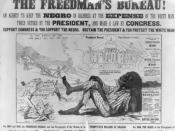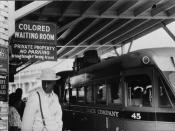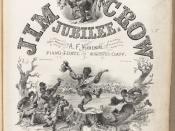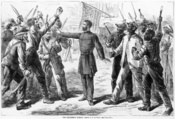The Reconstruction Period was a time of great hardship for the United States. President Andrew Johnson was faced with the task of reuniting the North and South together after the Civil War. The Reconstruction was a time when the government thought that all people needed human rights even African Americans. Until this point African Americans had no rights. They were still considered less than a full person in a society that proclaimed that all of God's people are created equal. The national debate over reconstruction began during the civil war. Laws were put into place that gave African American rights but they failed drastically. The reconstruction was definitely a failure because of the Jim Crow laws.
As the era of slavery, most black southerners remained in a cycle of poverty that allowed almost no escape. African Americans still lacked property, economic opportunity and political power. Some ex-slaves wished to work their own land.
Federal government sometimes granted land to blacks. Former slaveowners tried to impose contract labor. But still blacks insisted on sharecropping. Blacks formed the majority of the Republican Party in the South. (Enter more info here about the house and congress all that)
During the Reconstruction was increasingly segregated. The South designed black codes to return blacks to semi-slavery. Much violence and discrimination continued on a large scale during Reconstruction. Jim Crow gave much contribution to the segregation in America. The Jim Crow laws legalized segregation and restricted black civil rights. The North and Federal government did little or nothing to prevent these laws. There were secret societies that sought to keep blacks out of political processes as well as to oppress them. These terrorist organizations also brought insurrections against state governments. After the withdrawal of federal troops from the South, southern state government and terrorist organizations such as the Ku Klux Klan denied African Americans the right to vote. As a result 187 blacks were lynched yearly from 1889-1899. Racist attitudes toward African Americans continued, in both the South and the North.
The Fourteenth and Fifteenth amendments guaranteed African Americans the rights of citizenship, equal protection under the law, and suffrage. African Americans gained the right to testify in court and to sit on juries. The Freedmen's Bureau and other organizations helped many black families obtain housing, jobs, and schooling. With the United States allowing these amendments African Americans were no longer subject to the humiliation if the Jim Crow laws.
The Reconstruction of the South was unsuccessful because it did not succeed in giving blacks equal rights and in the end, the south socially, economically, and politically returned the same, if not worse as before the war, which concludes that it was completely ineffective. But despite its overthrow, Reconstruction left an important legacy: commitment to a republican society based on equality under the law, as exemplified in the Reconstruction-era legislation that remained on the books even when unenforced. A century later, during the civil rights movement, Americans, both black and white, would build on that legacy, as they renewed their struggle for equality.
The Reconstruction of the South was unsuccessful because it did not succeed in giving blacks equal rights and in the end, the south socially, economically, and politically returned the same, if not worse as before the war. The Reconstruction left an important mark in America's history. However African Americans through the civil rights movement were able to pull themselves through this problem a reign victoriously as they have and will continue to do all through history.





